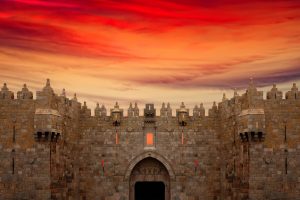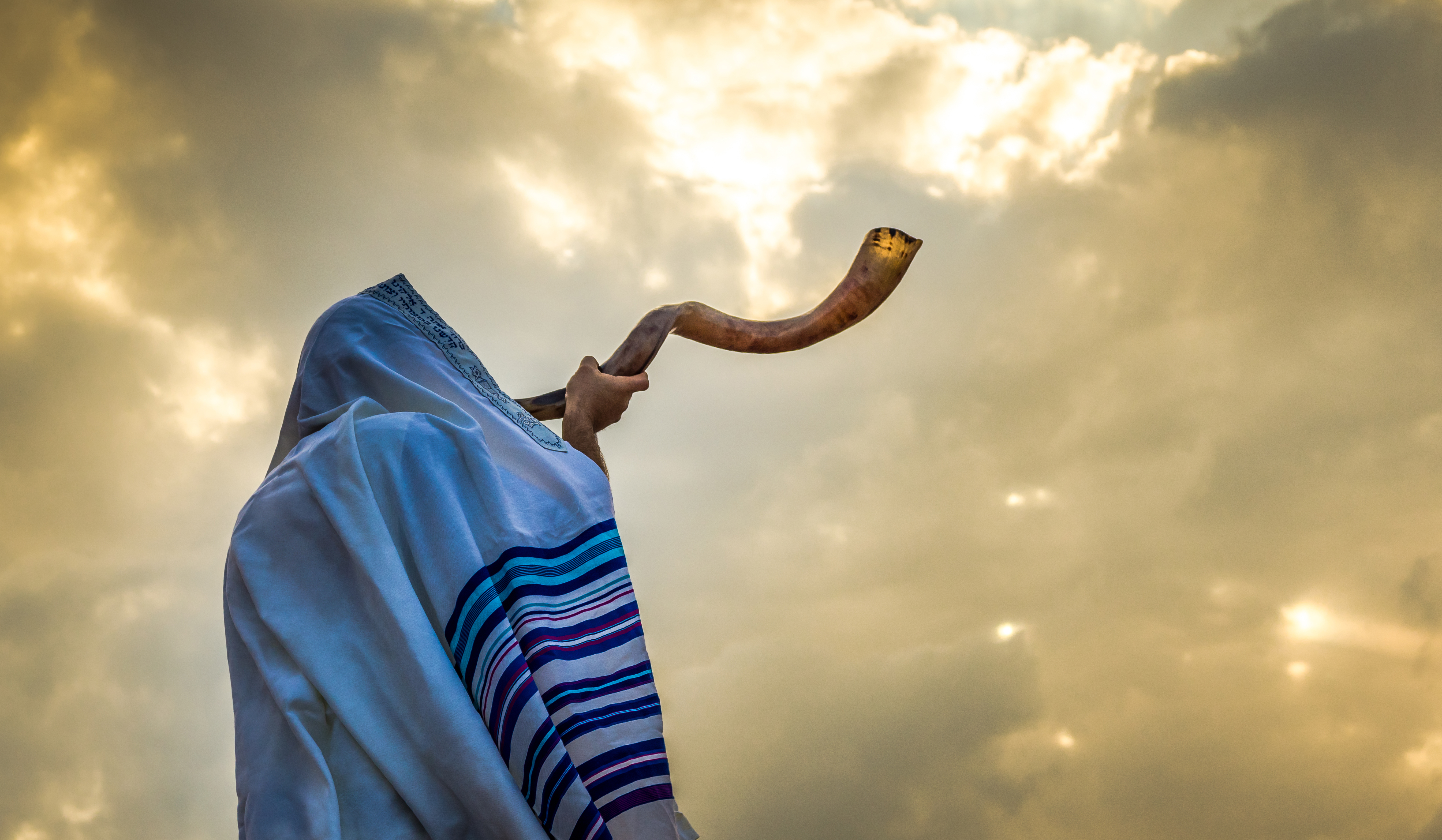The Lord said to Moses, “Say to the Israelites: ‘On the first day of the seventh month you are to have a day of sabbath rest, a sacred assembly commemorated with trumpet blasts. Do no regular work, but present a food offering to the Lord.’ (Leviticus 23:23-25)
The Day of Trumpeting: back to the original meaning
Of all the biblical feasts, this is the only one we don’t refer to using its biblical name. It is also a holiday that has had subsequent traditions superimposed on it, obscuring its original prophetic meaning. The biblically holiday we celebrate as the first of the fall high holidays is not called Rosh Hashanah (New Years) by the Bible but rather the Day of Trumpeting. The Bible mandates this holiday take place on the first day of the 7th month of the biblical year—not the first—which is Nissan, the month of Passover. The reason this holiday meant to be commemorated by trumpet blasts came to be known as the New Year (Rosh Hashanah) dates back to the Babylonian exile: during their time in Babylon, the Jewish exiles were influenced by the Babylonian culture around them, and, as a result, they adopted Akkadian\Babylonia month names and practices. That’s right, all the Hebrew month names are Babylonian in origin.

While the celebrations of this holiday mainly focus on the new year aspect, the traditions observed in this holiday harken back to the original biblical meaning for this somewhat mysterious holiday—mysterious because the bible gives surprisingly little information about the holiday other than the ordinance to observe it as a Sabbath, to blow the shofar (trumpet), and to make offerings and sacrifices. The blessings recited during the holiday meal repeatedly call for God’s deliverance from Israel’s enemies and implore God’s mercy in judging His people. Rabbinic literature refers to this holiday as the day of judgement, the day on which the people pass as sheep before God, the great shepherd.
Trumpeting: what does it mean?
As this day is called Yom Teruah (the day of trumpeting), and blowing the trumpet is the integral commandment of this day, it would make sense to understand what the Bible has to say about the purpose for trumpeting. Numbers 10: 1-9 gives a clear four-fold meaning for the “lasting ordinance” to blow the trumpets:
- To assemble the community together
- To signal the camps to move out
- To call for God’s help when going into battle in the Land against an oppressive enemy
- For heralding times of rejoicing
New Testament References to Trumpeting

The New Testament also references the sounding of trumpets, and that is in relation to end time events. The book of Revelation describes a series of 7 seals and 7 trumpets which are then followed by 7 bowls of wrath, all of which relating to phases of God’s releasing His judgement on the earth.
Other New Testament accounts reveal an important emphasis on the last trumpet in particular. Since Revelation is the only place in the Old and New Testaments which gives a numbered series of trumpets, the last trumpet in Revelation must correlate to end time events, as the other references reveal:
Behold, I shew you a mystery; We shall not all sleep, but we shall all be changed,
In a moment, in the twinkling of an eye, at the last trump: for the trumpet shall sound, and the dead shall be raised incorruptible, and we shall be changed. (I Corinthians 15:51-52)
For the Lord himself will come down from heaven, with a loud command, with the voice of the archangel and with the trumpet call of God, and the dead in Christ will rise first. After that, we who are still alive and are left will be caught up together with them in the clouds to meet the Lord in the air. (I Thessalonians 4:16)
The New Testament makes abundantly clear that the “last trumpet” heralds the rapture of the saints, the imminent return of the Lord and the wrath of the Lord poured out on the earth before His return. The question remains: do these end time trumpets have anything to do with the Day of Trumpeting mandated in the Law? While the spring biblical feasts (Passover, Pentecost, and Weeks) foreshadowed the first coming of the Messiah as the suffering servant and initiated His kingdom in the hearts of men, is it possible that the fall feasts (the Day of Trumpeting, the Day of Atonement, and Tabernacles) coincide with the Lord’s second coming as a judge and the coming of His literal, physical kingdom to the earth in Jerusalem?
The Joel 2 and the End Time Connection

When lining up the end-time events described in the book of Revelation with the description of end time events in the book of Joel, it becomes clear that the fall feats mirror exactly the progression of the great and terrible day of the Lord just before His return when the armies of the antichrist descend upon the land of Israel and surround Jerusalem.
Joel 2: 1-11 (Day of Trumpeting)
Blow the trumpet in Zion; sound the alarm on my holy hill. Let all who live in the land tremble, for the day of the Lord is coming…
In this passage, the prophet Joel describes the sounding of the trumpet to assemble the people together because a horrible and fierce enemy has invaded the land (remember back to the Rosh HaShanah meal blessings calling for deliverance from enemies). This is also the moment that the Lord Yeshua appears in the sky with the voice of the trumpet and the dead in Messiah are raised and those still alive are raptured.
Joel 2:12-17 (Day of Atonement)
“Even now,” declares the Lord, “return to me with all your heart, with fasting and weeping and mourning.”
This passage in Joel 2 clearly mirrors the Day of Atonement, a time the Lord mandated the Israelites to fast and torture their souls in repentance; here the prophet Joel calls all the people, young and old, men and women, to declare a holy fast and call a sacred assembly to weep, mourn and cry out to the Lord to save them.
Interestingly, Joel 2:15 calls for a fast, which is the Day of Atonement, but it also calls for a trumpet to be blown in Zion, which makes us think that it might also mean the Day of Trumpeting since there are no trumpets blown on the Day of Atonement. However, trumpets are indeed blown on the Day of Atonement every Jubilee year, that is, every 50th year, which brings in an additional level of prophetic meaning to this “last” Day of Atonement—liberation and restoration. (Leviticus 25:9)
All Israel Will Be Saved

The scene that Joel 2:12-17 describes brings to mind another end time prophesy which describes a day when all the nations of the earth are gathered against Judah and Jerusalem and the people cry out in mourning before God:
“And I will pour out on the house of David and the inhabitants of Jerusalem a spirit of grace and supplication. They will look on me, the one they have pierced, and they will mourn for him as one mourns for an only child, and grieve bitterly for him as one grieves for a firstborn son. On that day the weeping in Jerusalem will be as great as the weeping of Hadad Rimmon in the plain of Megiddo. The land will mourn, each clan by itself, with their wives by themselves…” (Zechariah 12:10-12)
This is the moment that Paul’s prophetic declaration in Romans 11:26 that all Israel will be saved comes to pass. The Bible teaches that Israel will go through terrible tribulation and suffering, but Israel will also be the only nation that collectively receives a simultaneous revelation of Him, accepts Him and is saved, just as Peter in Acts 2 quotes Joel 2 describing that final moment: “And everyone who calls on the name of the Lord will be saved.” So, if the season of the Day of Trumpeting marks the rapture and the Lord’s appearing in the sky, and the Day of Atonement marks Israel’s calling a fast and solemn assembly to weep and mourn over “the one they have pierced”, then Tabernacles can be none other than Yeshua’s triumphant entry into Jerusalem where He will tabernacle with His people!















